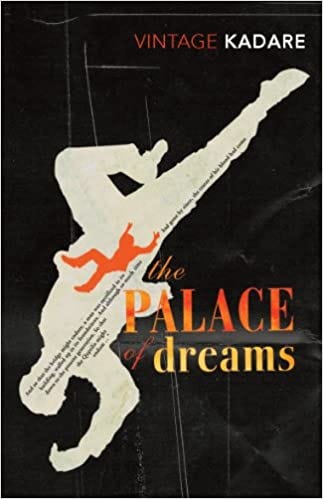The Palace Of Dreams by Ismail Kadare
The Palace Of Dreams
Author: Ismail Kadare
Genre: Literary Fiction
Date: 26 September 2021
Rating: 4 stars
Review: I’m back with another book from the Around The World In Books Challenge I set for myself earlier this month. No one is as surprised as I am. I am not the best at committing to challenges especially since I set this for myself and I know what a bullshitter I am. If I go at this pace I will be doing this challenge for 97.5 months. I’ll let you do the rest of the math to figure out how old I’ll be by the time I’m done with it.
The next country on the alphabetical list was Albania and I picked up The Palace of Dreams by Albanian poet and novelist Ismail Kadare. (I know he is not a woman but like I said for some countries I’m going to break the rules the bullshitter said and read books by men.) One major reason, apart from the one to do with this challenge, behind picking up this book was that someone in a GoodReads review compared it to Franz Kafka’s Metamorphosis. The word Kafkaesque has become synonymous with a genre of books that you won’t completely understand but will feel immensely clever and proud of yourself for even understanding a part of it. That’s how I feel after finishing this book, too. Even though I would describe this one more as an Orwellian piece of fiction. (God! I sound pretentious. I love it!)
Let me set things straight, I’ve always been the kind of person who finds it difficult to stop myself from rolling my eyes into another dimension every time anyone talks about the deeper meaning behind their dreams, hidden symbols and their implications on their lives. Going by that logic this book was not the best option for me. But I strangely loved the same angle in this book. The Palace of Dreams is a sinister ministry that collects, analyzes and interprets the dreams of all the subjects in the country to send one Master-Dream on every Friday to the Sultan and predict the future of the country. Mark-Alem, our main character, comes from a powerful Albanian family and is encouraged to take up a job in the prestigious institution. Thus, begins his ascent to the top even though he is confused and rises up through the departments so quickly that he never quite learns all the aspects of his job before he moves on to the next one. The more he works in the labyrinth-like palace, the more Mark-Alem loses touch with the real world. The real world loses its colour, instead turning into a gray, dull shell of the world he remembered and becomes increasingly isolated, his only connection to people outside the ministry are his family members.
You know that dream when you are walking through a passage or a corridor, without knowing where you’re headed or how to get there. Reading this book felt like being in that dream. It didn’t help that Mark-Alem had the same experience. The corridors of the ministry and our main character’s experiences of being lost in the passages had this strange claustrophobic vibe to it that is a testimony to Kadare’s writing style.
Important political families in history have lost their position of power and come back in one way or another, rising from the ashes, through the centuries. Mark-Alem does not share a surname with the Qupirili family because he is related to them on his mother’s side. Just like the Qupirili family rose to power after leaving behind their original surname, hoping to detach themselves from the legend that sets the conflict of this book in motion, Mark-Alem’s rise to power after the downfall of his family and the imprisonment of his uncle is just a way for the circle of life to go on rotating.
The book is filled with symbolism. Trying to uncover each of the said symbols makes me sympathetic towards those trying to delve through the depths of the dreams trying to make sense out of them. I believe every re-read of this book will be a discovery of some new hidden depth and it might also be true that I’m not intelligent enough to understand all of it without someone pointing it out to me.
A part of me wonders what the Interpreters at the Palace of Dreams would have to say about my dreams of being lost in a water park, getting into loud arguments with people (My fear of confrontation mysteriously evaporates in my dreams.) and losing all my teeth. What do they predict about the country’s destiny? And will they result in me finding my new home a black coffin? But oh well, we will never know.

